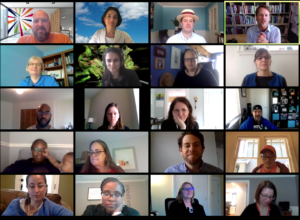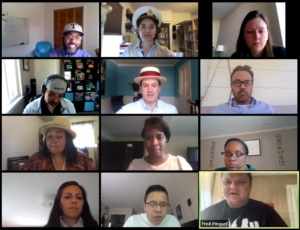The Student-Centered Learning Research Collaborative hosted its bi-annual grantee convening May 7-8. Our original plans were to meet in Philadelphia and visit with student activists and educators, but like so many of us are doing these days, we shifted everything to virtual. We met on screens rather than in rooms. We connected over Wi-Fi rather than coffee. From our kitchen tables and couches, we found ways to share progress and projects, advance each other’s work and have a little fun.
 Over the years, we’ve grown to relish our in-person convenings. They’re where we solve problems of practice, refine public-facing components and ask big questions about equity-driven and learner-centered approaches. This time, however, we convened across four time zones in a series of virtual sessions over two days. Our research teams, Distinguished Fellows, youth researchers, funders, and KnowledgeWorks staff all gather in big and small groups to:
Over the years, we’ve grown to relish our in-person convenings. They’re where we solve problems of practice, refine public-facing components and ask big questions about equity-driven and learner-centered approaches. This time, however, we convened across four time zones in a series of virtual sessions over two days. Our research teams, Distinguished Fellows, youth researchers, funders, and KnowledgeWorks staff all gather in big and small groups to:
- surface our concerns about and plans for the future of student-centered learning and how the field is responding to the current and post-COVID world
- adapt our research projects to optimize their impact despite challenges associated with data-gathering when schools are closed
- support youth researchers to build investigations that are anchored in their academic interests and intersectional expertise
- prepare the toolkits, websites, articles, and other communications to inform educators and stakeholders about what we’re learning

At multiple points over the two days, we recognized that this is a critical moment for leaders in student-centered learning to challenge any return to “normal”. Everyone noted that the pandemic is exacerbating pre-existing inequities in education, revealing as much as magnifying the effects of marginalization. If we simply regress to the way things were, we’ll lose the precious opportunities this crisis affords. But if we press for a future where equity in opportunities and outcomes is prioritized, where youth regularly experience student-centered approaches, and where educators are supported to implement the best research-based strategies, then we’ll be on our way toward repaying the educational debt it’s so clear we owe.
And so, while there was nothing normal about our virtual convening or the circumstances that surround us, we’re excited that our work continues — even if it’s happening at our kitchen tables and couches — and look forward to sharing findings and resources with you in the months ahead.